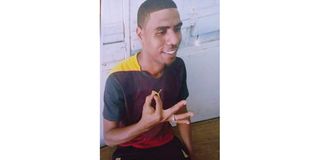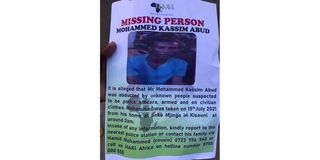Desperate families seek kin after midnight ‘abductions’ by gunmen

A photo of Radhi Awadh who was allegedly picked up by armed men on July 15, and has not been seen since.
Two families in Mombasa are crying for justice after their sons were allegedly abducted by unknown gunmen.
Radhi Awadh, 31, and Mohamed Kassim Abud, 25, were allegedly picked up by armed men on July 15, and they have not been seen since.
The two were picked up at midnight and at 2am respectively by people their family claim identified themselves as police officers.
According to Mr Abud’s uncle Ahmed Ali, the 25-year-old was taken from his house at Soko Mjinga in Kisauni and bundled into a vehicle.
“His house was broken into by at least 10 armed men. He was questioned then taken. We have not heard from him since,” Mr Ali said.
The armed men, upon forcing themselves into his house, ordered the occupants to get out.
The family said the men had the names of people that they were looking for.
“They knew the person they were looking for because when they entered the house, they asked for his name (Mr Abud),” Mr Ali said
The family says Mr Abud worked as a matatu tout and fishmonger.
Family members said they were not aware of any criminal offence he may have committed to warrant his abduction as he was known as a humble person who was focused on his business.

A missing persons poster of Mohamed Kassim Abud who was allegedly picked up by armed men on July 15, and has not been seen since.
Mr Awadh was taken the same way. In his case, the armed men entered the house and ordered family members to lie down on their bellies.
His father, Awadh Ali Slum, said the men broke into his house at midnight and demanded to see his son.
They then interrogated Mr Awadh and asked him to provide his accomplices’ names.
“They asked him to provide the names of people we did not know. At first, we thought we had been attacked by criminals,” Mr Slum said.
He said that after questioning his son for a few minutes, the men left with him without saying a word to them.
The gunmen also took photos of two of his sons who were in the house at the time, he said.
“They also took away their phones. Mr Awadh was scheduled to marry this December but we fear this might not happen if he is not found,” he said.
Mr Awadh, his family said, was arrested in 2018 by the police but they were not told the reason for the detention.
But he was released later.
“He was a matatu tout. He was a humble man. Most of the time he minded his own business,” his brother Awadh Ali said.
The two families now want the police to help them find the two men.
At least 19 young people have disappeared in the same way in the past seven months, said rights advocacy group Haki Africa.
The group’s Rapid Response Officer Mathias Shipeta said instances of young people in Kisauni disappearing had increased in recent months.
“It is sad that families are losing their loved ones at a time when they need them most. The data in our possession indicates that we are losing youth at least every month under unclear circumstances,” he said.
He said the missing men should have been taken to court and prosecuted if they are suspected of committing any offence.
“Kenya is a country that is governed by law, and if there is evidence linking the youth to any criminal acts, then the least that should be done is arraignment in court,” he said.
Haki Africa deputy executive director Salma Hemed has warned that the high-handed approach used by security agencies to tackle violent extremism will not yield the desired results.
“We cannot continue to handle this sensitive matter in this manner. The hard approach will increase rebellion, and might see many youths cross the border to join terror groups,” she said.
She urged security agencies to work closely with non-governmental organisations to rehabilitate young people suspected of engaging in criminal activities.





